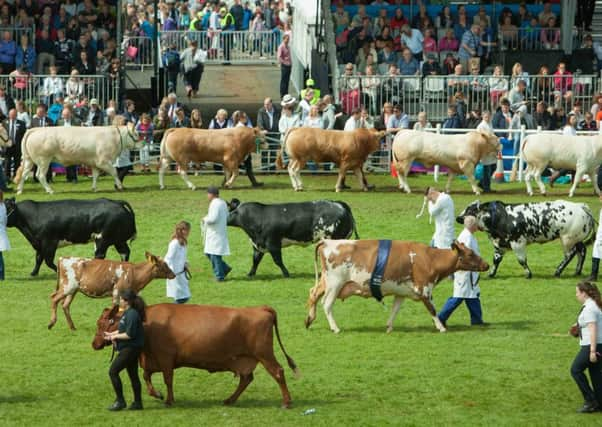Brian Henderson: Silver lining hard to discern at RHS


Zombie apocalypse it might not quite have been – but the juxtaposition of that comfortable setting with its avenues of gleaming machinery and the lines of primped and preened livestock with the earth-shattering news that the country had voted to leave the EU had produced a similar effect on many of those passing through the gates.
But the genuinely shocked faces and stunned demeanours were entirely understandable, bearing in mind the industry had just had the infrastructure and ground plan it has worked within for more than 40 years yanked suddenly and unceremoniously from beneath its feet.
Advertisement
Hide AdAdvertisement
Hide AdThere might have been some benefits arising from the two events coinciding though – in that the show did give the farming community the opportunity to indulge in some talking therapy.
Rather than brooding on the issue in the lonely isolation of their own farms, there was at least the chance to share the shock and disbelief with others of a like mind.
There might even have been the opportunity to try to find out just what the implications and ramifications would be – but facts were difficult to tie down, with informed speculation being the best on offer.
With a surprising number of scenarios still possible, though, even the best guesswork had to follow a line of diverging possibilities.
In political circles, the likelihood of a second indy ref was certainly mapped out in short order.
While farmers were amongst the staunchest supporters of the union last time round, judging by the initial reaction to the Brexit vote on display on Friday, no huge carrot would be required to tempt the sector over to what they might previously have viewed as the dark side.
But even a rushed independence vote would be hard-pushed to have the required legislative procedures in place before exit is thrust upon us – for countries at the core of the union have already made it plain that they want a clean break and that the UK should press ahead with Article 50 immediately.
It’s also clear the UK will inevitably face a tortuous and painful departure – if for no other reason than, with growing signs of nationalist tendencies on the ascendancy across Europe, “pour encourager les autres” not to follow the same course of action.
Advertisement
Hide AdAdvertisement
Hide AdBut if the domino theory materialises, a newly independent Scotland could find itself applying to join what by then might be a lame duck European Union.
The alternative route, sticking with Brexit, probably doesn’t have much more to recommend it. A columnist’s description of those leading the Leave campaign as “opportunistic toffs, reactionary clubmen and stockbroker belt quasi fascists” probably couldn’t be bettered.
From the farming industry’s point of view, that probably sums up their qualifications for – and desire to – look after our sector. If these lunatics take over the asylum, despite the promises that the money which will no longer wing its way to Europe will be spent on the home front, the chances of anything more than a token amount of this over-promised fund working its way into farm support is slim at best.
With the few mentions of food made outside the set-piece farming sector debates revolving around a vague promise to make it cheaper, the market place is unlikely to be a source of our salvation.
Continuing to pile the joy high with a five-pronged graip, no bonfire of regulations will be on the cards if we want to maintain any sort of trading deal with our markets in Europe.
World Trade Organisation regulations – with which we’ll still need to comply – will also squash any wild dreams of a return to a deficiency scheme-style payment system.
But could there be any good news in this litany of doom?
A sharp fall in land prices – and with it rental values – could offer opportunities for some in the industry.
Paradoxically, in the short term, any repeat of the sharp slide in Sterling seen early on Friday could boost commodity prices for the industry.
And I’ve been given a firm assurance that SGRPID’s new £178 million computer system will be able to handle the future!
